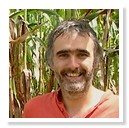|
Steve Beebe – Product Delivery Coordinator, Beans

Stephen Beebe received his BSc degree in horticulture in 1974 from Iowa State University, and MSc and PhD degrees in Plant Breeding-Plant Genetics from the University of Wisconsin in 1976 and 1978, respectively.
He has spent his career in the International Center for Tropical Agriculture (CIAT) in Cali, Colombia as a breeder of common bean (Phaseolus vulgaris), serving both Latin America and East and southern Africa. He has worked on disease and pest resistance, nutritional quality, and more intensively in the past decade on abiotic stress: tolerance to drought, aluminum, and low soil phosphorus, in particular seeking tolerance to combined stresses as a key to improving bean yields in the tropics.
Back to top
|
|
Emmanuel Okogbenin – Product Delivery Coordinator, Cassava

Emmanuel Okogbenin holds a PhD in Plant breeding and Molecular Genetics. He has broad practical experience in cassava improvement research. His research goals are driven by the need to expand food production, and to alleviate poverty through enhanced income for farmers through modern breeding techniques.
In his expansive career in cassava research, he has worked at the African Agricultural Technology Foundation (AATF), the International Institute of Tropical Agriculture, the International Center for Tropical Agriculture, and the National Root Crops Research Institute (NRCRI) in Nigeria. His research background cuts across different fields, covering plant breeding; genomics and markers; marker-assisted selection (MAS); germplasm development and genetic diversity; agronomy; and stress physiology.
Through GCP-funded activities, he has efficiently used MAS for cassava mosaic disease resistance in deploying novel germplasm from the Neotropics to Africa, and is currently developing marker-assisted recurrent selection-bred varieties for improved productivity in drought ecologies. Emmanuel is involved in collaborative research partnership activities complementary to the GCP mission. He is the project manager for several cassava research projects funded by the International Atomic Energy Agency, the Alliance for a Green Revolution in Africa and NRCRI. He is currently the Director of Technical Operations at AATF. Previously, he was the head of NRCRI's Molecular Breeding Unit and coordinated a network of cassava breeders in four countries in Africa. He has key publications on QTL mapping and MAS studies in peer-reviewed international journals.
Back to top
|
|
Pooran Gaur – Product Delivery Coordinator, Chickpeas

Pooran M Gaur is a plant breeder by training and currently a Principal Scientist (Chickpea Breeding) at the International Crops Research Institute for the Semi-Arid Tropics (ICRISAT) in Patancheru, Hyderabad, India.
He has a PhD in Crop Science from the University of Saskatchewan, Saskatoon, Canada, a Master's degree in Agriculture with specialisation in Plant Breeding and Genetics and a Bachelor's degree in Agriculture, both from Jawaharlal Nehru Agricultural University, Jabalpur, India.
Prior to joining ICRISAT in 2001, he worked for over 20 years at Jawaharlal Nehru Agricultural University in various capacities from Assistant Professor to Professor. The vast majority of his considerable years of research experience has been spent on chickpea genetics and breeding.
Pooran developed the first chickpea linkage map, which is widely cited. Presently, he is actively involved in marker-assisted breeding of chickpea for improving resistance and tolerance to abiotic and biotic stresses. He has been associated with GCP since its inception as both a Principal Investigator (PI) and Co-PI of various projects on chickpea. He is involved as an Activity Leader in both Tropical Legumes I and Tropical Legumes II projects.
Back to top
|
|
Ousmane Boukar – Product Delivery Coordinator, Cowpeas
 Ousmane Boukar obtained his BSc from Dschang University in Cameroon, and both his MSc and PhD in Plant Breeding and Genetics from the University of Purdue, West Lafayette, Indiana, USA. Ousmane Boukar obtained his BSc from Dschang University in Cameroon, and both his MSc and PhD in Plant Breeding and Genetics from the University of Purdue, West Lafayette, Indiana, USA.
From 1990 to 2007, he worked with the Institute of Agricultural Research for Development (IRAD), Maroua, Cameroon, as a cowpea breeder, while also serving as host-country Principal Investigator (PI) of the Bean/Cowpea Collaborative Research Support Program (B/C CRSP) (2002‒2007); Chief Scientific Officer at Maroua Regional Centre (2003‒2005); and Regional Scientific Coordinator (2005‒2007).
In 2007, Ousmane joined the International Institute of Tropical Agriculture (IITA) as a cowpea breeder based in Nigeria. His main responsibility is to exploit all available research tools to develop improved cowpea cultivars using adapted and introduced germplasm. The focus of his research is cowpea genetic improvement for higher productivity in sub-Saharan Africa (SSA). To accomplish this, he (1) conducts high-quality research to decipher the genetic basis of resistance or tolerance to biotic and abiotic stresses that reduce yield; (2) develops breeding populations comprising of lines with multiple desirable traits; (3) tests these populations in cowpea-growing areas across SSA with national, NGO and international partners; and, (4) in collaboration with advanced-research-institutions scientists, develops creative approaches for the exploitation of genomics and genomic data for cowpea germplasm enhancement and improvement.
Back to top
|
|
Patrick Okori – Product Delivery Coordinator, Groundnuts
|
|
Nourollah Ahmadi – Product Delivery Coordinator, Rice
Nour Ahmadi received his PhD in Genetics and Plant Breeding from the University of Paris XI-Orsay France. He then spent 15 years in Madagascar and Mali as a rice breeder for rain-fed ecosystems with emphasis on yield stability. In Madagascar, Nour developed photosensitive improved varieties combining flexibility of crop establishment date and safety of fixed flowing date within the rainy season. He also analysed the genetic diversity of Malagasy rice and detected traditional varieties originating from inter-subspecific recombination. In Mali, he coordinated the Conférence des responsables de la recherche agronomique africains et français (CORAF) rainfed rice breeding network for West Africa, and released the first lowland variety with partial resistance to Rice Yellow Mottle Virus (RYMV); he then developed NILs for QTLs involved in resistance to RYMV and confirmed their epistatic relationship. Currently, he is based in France, working within a group of ecophysiologists, geneticists and breeders involved in association analysis for abiotic stresses including variable soil water status and drought. Nour coordinates rice and sorghum breeding programmes in Africa and Latin America, involving Agropolis–CIRAD scientists. He also supervises PhD students for analysis of rice in situ diversity in Africa and Madagascar. Since 2002, Nour has been a member of the Editorial board for the well known academic journal Euphytica.
Back to top
|
|
Jean-François Rami – Product Delivery Coordinator, Sorghum

Back to top
|
|
Richard Trethowan – Product Delivery Coordinator, Wheat

Richard holds a PhD in Plant breeding and a BSc. in Agriculture from the University of Sydney, Australia, and currently works at the self-same institute as Professor of Plant Breeding and Director of the Watson Grains Research Centre.
He began his career as a Postdoctoral Fellow and Associate Scientist in CIMMYT's Wheat Programme, after which he returned to his old study haunts in Sydney as a wheat breeder. He then became a Senior Wheat Breeder at Agriculture Victoria, Australia. Thereafter, and equipped with a wealth of breeding knowledge and experience from the CGIAR, a university and a national government department, Richard returned to CIMMYT as Principal Scientist and Head of Wheat Breeding for Rainfed Environments, a position he held for ten years, before moving to his current position in Sydney.
In his roles at CIMMYT, Richard worked closely with scientists in developing country research programmes to deliver superior, drought-tolerant wheat germplasm. His recent work with the University of Sydney have taken him to India with the express purpose of implementing molecular technologies in applied wheat breeding.
Richard has a specific research interest in the drought tolerance and water-use-efficiency of broad-acre crops and he has published extensively on this and related subjects.
Back to top
|
|
Leon Kochian – Product Delivery Coordinator, Comparative genomics (maize, rice and sorghum)

Leon holds a BA in Botany from the University of California–Berkeley (USA) and a PhD in Plant Physiology from the University of California–Davis. Following his PhD studies, he joined the USDA–ARS Center on the Cornell University campus (USA), where he now works as Director of the organisation's Robert W Holley Center for Agriculture and Health (also on the Cornell University campus), as well as doubling as a Professor in the Departments of Plant Biology and Crop and Soil Science at Cornell University.
Leon's research deals with the molecular biology and physiology of crop mineral ion transport processes as they relate to mineral nutrient acquisition, crop responses to abiotic environmental stresses, and micronutrient density of food crops. A significant component of his research programme involves the elucidation of genes and physiological mechanisms underlying cereal crop acid soil tolerance, with a focus on tolerance to aluminum (Al) toxicity and the use of these genes to improve cereal production on acid soils. He has been the Principal Investigator (PI) of, and collaborating researcher in, three GCP competitive grants on sorghum and maize aluminium tolerance.
In his current role as PDC for the Comparative Genomics Research Initiative, Leon's focus is on exploiting recent discoveries of the molecular basis for aluminium tolerance in sorghum and phosphorous uptake efficiency, all for improving the ability of rice, maize and sorghum to tolerate acid soils.
Back to top
|




 Ousmane Boukar
Ousmane Boukar

